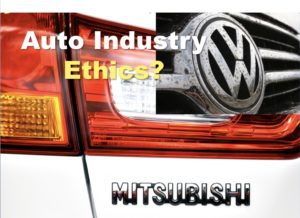Fake it till ya make it. That seems to be the mantra in the automotive industry these days. With Volkswagen admitting to willfully deceiving emissions we also know that, by their own admission, Mitsubishi Motors admitted that they had falsified fuel efficiency tests for the past quarter century. Investors responded by pushing Mitsubishi shares down by 10%. The impact of both scandals is unfolding having a serious impact to investors and consumers alike. These are glaring examples of auto industry ethics gone haywire!
 The Fallout:
The Fallout:
For Volkswagen related to the consumers of their faulty products Auto Week reports the following:
Owners of affected VW diesel vehicles can choose to sell their cars back to Volkswagen or to terminate their leases without the monetary penalty typically associated with lease termination. Alternatively, owners will be able to have their vehicles repaired by VW and keep them.
Regardless of option, owners will also be offered a cash settlement from Volkswagen, now estimated to be between $5,100 and $10,000, depending on the vehicle and other factors. Those details are expected to be published on July 26, following a four-week commenting period that will determine the compensation scale for payments on top of the vehicle value.
Read more: http://autoweek.com/article/vw-diesel-scandal/vw-diesel-settlement-heres-what-it-means-tdi-owners#ixzz4D0L7rN8p
While this fix addresses the consumer, the value of Volkswagen stock dropped from $160 before the announcement of emissions deception to $108 and change as of today. That represents a 32% decrease in price and that are many who aren’t yet sure if Volkswagen has seen the bottom.
Of course, old news, but VW’s CEO Martin Winterkorn announced his resignation, stating:
“As CEO I accept responsibility for the irregularities that have been found in diesel engines and have therefore requested the Supervisory Board to agree on terminating my function as CEO of the Volkswagen Group,” he said in a statement. “I am doing this in the interests of the company even though I am not aware of any wrong doing on my part.”
Mitsubishi President Tetsuro Aikawa recently announced that he would relinquish his job. While not admitted any wrongdoing in Japanese business culture, resignation is a showing remorse over their companies’ missteps.
According to Car and Driver:
Mitsubishi is compensating owners in Japan up to $960 each (¥100,000) for the falsified fuel economy claims, according to the Associated Press. President Tetsuro Aikawa and executive vice president Ryugo Nakao resigned on June 24.
Other automakers have been penalized in recent years for putting a rosy spin on fuel economy figures.
Korean carmakers Hyundai (HYMTF) and Kia agreed to pay a combined $100 million fine in the U.S. in 2014 for overstating fuel economy estimates for many of their vehicles. They also had to refund customers for the difference in estimated fuel costs.
That same year, Ford (F) said it would compensate owners of about 200,000 U.S. vehicles after discovering the cars’ gas mileage was overstated.
What’s Up Auto Industry Ethics?
In talking with industry insiders there is reasonable consensus that auto industry ethics are lacking and have been for years – some because of intent and other reasons because of lack of a firm ethical culture. The big question is WHY? Choices made in business, for the most part, are made to meet a competitive need, increase sales and profits and provide a return to investors. But when regulators step in mandating certain requirements that are to meet safety needs or society needs (emission controls for example) the business must respond. To correctly meet those needs costs money and potentially the competitive position of the company. NEED now has moved to the forefront and when the solution is not easy or cheap the temptation to cheat increases dramatically.
The problem is cheating just a little can create a culture where cheating is tolerated bit by bit till cheating is the solution and is widely (although hush hush) accepted as the cultural norm. When a companies CULTURE allows cheating there is a reduction in the SYSTEMS that are put in place to keep people between the ethical lines. Both companies above (when caught) have had to acknowledge that their SYSTEMS were insufficient to keep them acting in an ethical manner. Auto Industry Ethics are challenged at best and these examples are not the only ones that will come to the public eye.
YOUR COMMENTS ARE WELCOME!

